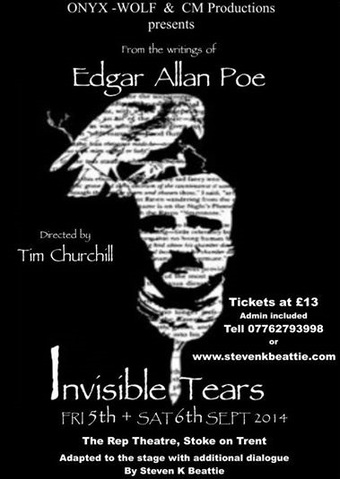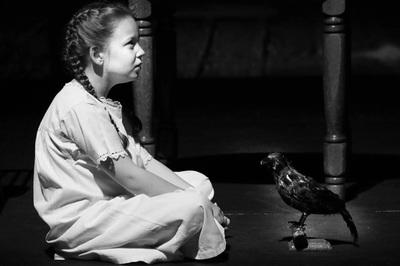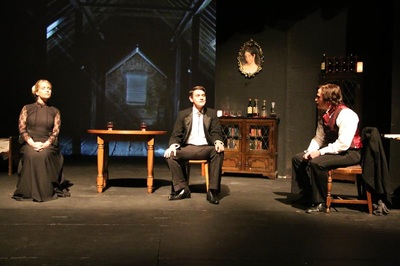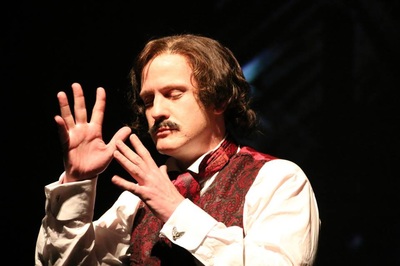'All That We Seem' is a play based on Edgar Allan Poe stories, adapted to the stage by Steven K Beattie.
The play was directed by Tim Churchill (Currently in the UK tour of Blood Brothers, previously appeared in Jesus Christ Superstar UK tour).
The play was produced by Philip Kempson of C M Productions.
The play premiered at Stoke Repertory Theatre on Sept 5th and 6th 2014, featuring a host of great, local talented actors/actresses.
To hire this play please visit: http://shop.stagescripts.com/categories/plays/full-length/drama/all-that-we-seem.html
Please feel free to contact if you would like more information.
The premiere poster is below, with the plays original title ' Invisible Tears' along with other show photos and a video of the 'The Raven' performed at the premiere by James Freeman. (Photo copyright R. Lawton)
Play Review by Diane Lane
"Potteries writer and actor Steven Beattie has created a remarkable piece of theatre inspired by the life and work of American author Edgar Allan Poe. The 19th Century author was famous in his lifetime, and his life and work have remained prominent from that time throughout popular culture in literature, music, films and television.
Poe was a poet, journalist, editor and literary critic, but he is best known for his tales of mystery and horror. Invisible Tears cleverly weaves together all these aspects of Poe’s life and work by using the writer at his desk as a framework for some spell-binding story-telling.
The curtain opens to reveal a set which perfectly complements the largely dark and serious subject matter: subdued lighting on sparse and sombre furnishings, dark walls and the distant view of an empty attic space. Music and sound effects are well chosen throughout.
Poe is a soul tormented by illness in mind and body, by separating from his sick wife, then grief at her death, neglect by an uncaring public and money troubles. He medicates himself with alcohol, and is driven always to write.
James Freeman gives a fine performance, effectively expressing Poe’s despair and pain, sometimes quietly and sometimes with passion, and he displays intense listening skills and superb interaction with the characters in his stories.
The first story is the most difficult: a lecture by the Devil on consuming bodies and souls of philosophers, ancient classical writers and historical figures, interspersed by the sneezes and hiccups of French chef Pierre Bon-Bon proved somewhat challenging. After that, the stories of mysterious death, murder and of the fear of being buried alive are balanced by an unexpected change of tone as Rob Lawton gives a delightfully camp telling of the story of the Dutch borough of Vondervottimittis, where the inhabitants are sealed off from the world in a valley where the only objects they know are clocks and cabbages.
The eleven actors are uniformly excellent, drawing the spectator into the lives of Poe’s characters, who have an urgent need to tell their stories and to be understood. There were two occasions when the level of emotion displayed undermined the clarity and power of the story, namely during the latter part of The Tell-Tale Heart and in the delivery of Poe’s most famous poem, The Raven.
Those moments apart, Tim Churchill’s direction is pitch-perfect, achieving a skilful balance between stillness and movement, calm and powerful emotion, contemplation and sudden activity. This production deserves to be seen more widely, and I hope very much that it is."
Poe was a poet, journalist, editor and literary critic, but he is best known for his tales of mystery and horror. Invisible Tears cleverly weaves together all these aspects of Poe’s life and work by using the writer at his desk as a framework for some spell-binding story-telling.
The curtain opens to reveal a set which perfectly complements the largely dark and serious subject matter: subdued lighting on sparse and sombre furnishings, dark walls and the distant view of an empty attic space. Music and sound effects are well chosen throughout.
Poe is a soul tormented by illness in mind and body, by separating from his sick wife, then grief at her death, neglect by an uncaring public and money troubles. He medicates himself with alcohol, and is driven always to write.
James Freeman gives a fine performance, effectively expressing Poe’s despair and pain, sometimes quietly and sometimes with passion, and he displays intense listening skills and superb interaction with the characters in his stories.
The first story is the most difficult: a lecture by the Devil on consuming bodies and souls of philosophers, ancient classical writers and historical figures, interspersed by the sneezes and hiccups of French chef Pierre Bon-Bon proved somewhat challenging. After that, the stories of mysterious death, murder and of the fear of being buried alive are balanced by an unexpected change of tone as Rob Lawton gives a delightfully camp telling of the story of the Dutch borough of Vondervottimittis, where the inhabitants are sealed off from the world in a valley where the only objects they know are clocks and cabbages.
The eleven actors are uniformly excellent, drawing the spectator into the lives of Poe’s characters, who have an urgent need to tell their stories and to be understood. There were two occasions when the level of emotion displayed undermined the clarity and power of the story, namely during the latter part of The Tell-Tale Heart and in the delivery of Poe’s most famous poem, The Raven.
Those moments apart, Tim Churchill’s direction is pitch-perfect, achieving a skilful balance between stillness and movement, calm and powerful emotion, contemplation and sudden activity. This production deserves to be seen more widely, and I hope very much that it is."





